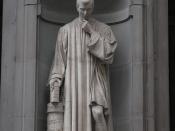What is the perfect man? Does one exist? Throughout time, man has been cursed with many flaws. These flaws can range from simple to complex and can be both easy to fix or impossible to repair. Machiavelli, Martin Luther and William Shakespeare, in their writings, discussed the faults of man. Whether their flaw is selfishness, pride or irrationality, each author describes what it is and discusses ways in which to correct these imperfections. On the other hand, Miguel de Cervantes wrote about a man, Don Quixote, whose thoughts and actions were so strange and revolutionary that everyone around him considered him insane. However, unbeknownst to the population, they were the imperfect ones. Don Quixote was free of all of these flaws discussed by Machiavelli, Martin Luther and William Shakespeare. Perhaps it was Don Quixote, because of his naiveté and innocence, who was the epitome of perfection.
In Machiavelli's The Prince, he describes to Lorenzo de Medici how to become a great prince.
Machiavelli explains that in order to be a great ruler, one must exploit the weaknesses of man. Selfishness, as Machiavelli teaches, is man's Achilles' heel. Men are always too concerned with themselves to worry about what is happening around them. Machiavelli says: For it may be said of men in general that they are ungrateful, voluble, dissemblers, anxious to avoid danger, and covetous of gain; as long as you benefit them, they are entirely yours⦠(Machiavelli 90) Believing that man is inherently selfish, Machiavelli tells de Medici to make sure that he remains in favor with the public. Machiavelli also tells Lorenzo de Medici that selfish people should not be trusted. He writes, When you see the minister think more of himself than of you, and in all his actions seek his own profit, such...


